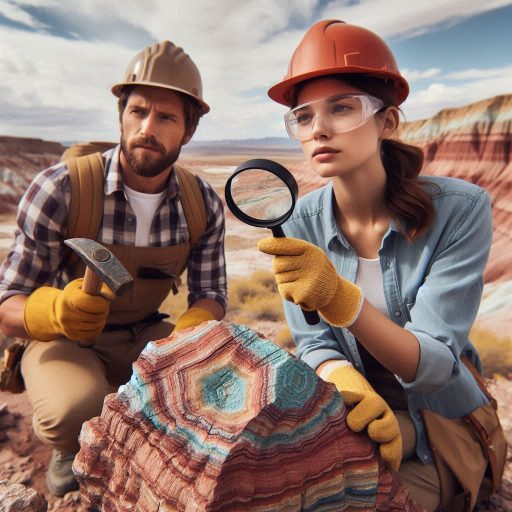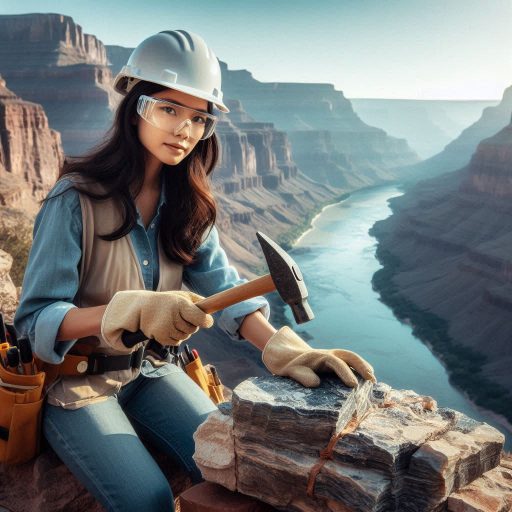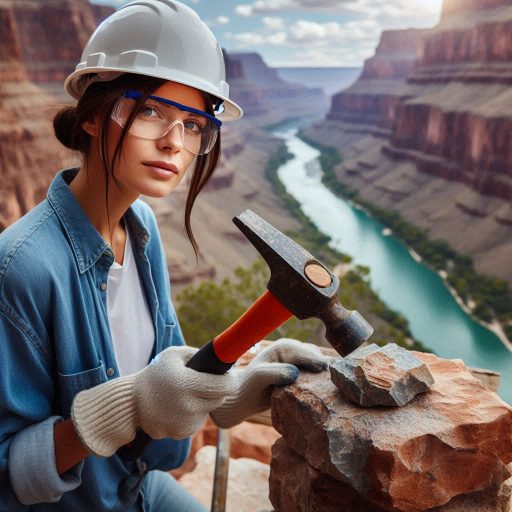Introduction
Geology is the study of Earth‘s structure, composition, and processes.
Geologists play a crucial role in understanding our planet’s history.
They explore rocks, minerals, and fossils to uncover information about past environments.
This knowledge is vital for various industries, including construction, environmental protection, and energy.
In construction, geologists assess soil and rock stability for building sites.
Their expertise helps engineers design safe and sustainable structures.
In environmental protection, geologists analyze land and water contamination.
They provide critical data to develop strategies for remediation and conservation.
The energy sector also relies heavily on geologists.
They evaluate mineral deposits and hydrocarbon reserves to ensure efficient resource extraction.
Their work guides drilling operations and minimizes environmental impacts.
Additionally, geologists contribute to natural hazard assessments.
They study earthquakes, landslides, and volcanic activity to mitigate risks and protect communities.
Geologists also work in education and research.
They share knowledge about Earth’s processes and resources, inspiring future generations.
Their contributions help society make informed decisions regarding land use and resource management.
Overall, the profession of geology is essential in addressing many of today‘s challenges.
Geologists‘ insights are invaluable in navigating complex environmental issues and ensuring sustainable development.
Their work impacts not only industry but also the health and safety of our planet.
Morning Routine
Wake up early to start the day
A successful day as a professional geologist begins early.
Most geologists wake up around 6:00 AM to maximize daylight hours.
This early start allows them to tackle their tasks effectively.
Morning routines set a positive tone for the day ahead.
Have Breakfast and Coffee to Kick-Start the Morning
After getting out of bed, geologists head straight to the kitchen.
Breakfast is essential for fueling the body and mind.
They often enjoy a nutritious meal, like oatmeal or eggs.
A well-balanced breakfast provides energy for the day‘s challenges.
Coffee is a vital part of the morning routine.
Geologists savor a fresh cup while contemplating their plans.
This ritual helps to shake off any morning drowsiness.
The caffeine kick ignites their focus and alertness.
It also serves as a moment of calm before the day‘s demands.
Review the Day‘s Schedule and Tasks
Once breakfast is complete, it‘s time to review the day‘s schedule.
Geologists often have diverse tasks on their agendas.
They may have fieldwork planned or meetings to attend.
Reviewing the schedule helps them prioritize and stay organized.
This practice ensures they don‘t overlook important tasks.
Geologists often use a planner or digital app for scheduling.
They jot down specific tasks, locations, and times.
This detailed planning makes it easier to manage their responsibilities.
Being organized is crucial in geology, where projects can vary widely.
Next, they gather any necessary materials for the day.
This could include field gear, notebooks, and safety equipment.
They might also pack sampling tools if they have fieldwork scheduled.
Having everything ready to go saves time later in the day.
Checking the weather is another important step.
Geologists rely heavily on weather conditions for fieldwork.
Rain, snow, or extreme heat can alter their plans.
By checking the forecast, they can adjust their schedule if needed.
Before heading out, geologists may take a moment for self-care.
A few minutes of stretching or meditation can help.
This time allows them to mentally prepare for the tasks ahead.
A positive mindset is essential for navigating challenges in the field.
Finally, they head out the door, ready for the day.
Whether they drive to a remote site or a lab, excitement fills the air.
Each day offers new discoveries and learning opportunities.
The morning routine of a geologist is a blend of preparation and anticipation.
It sets the foundation for a productive and fulfilling day ahead.
thing is for sure ‘ each day is an opportunity to learn something new and contribute to our understanding of the Earth’s geology.
Fieldwork
Head Out to Survey Sites to Collect Samples
Fieldwork is a crucial aspect of a professional geologist’s job.
Each day begins with preparing for the fieldwork ahead.
The excitement builds as geologists plan their surveys, eager to explore new sites.
They head out early in the morning, often driving to remote locations.
The journey offers a chance to appreciate the beauty of nature.
Upon arrival, geologists assess the area to determine the best sampling points.
Use Specialized Tools and Equipment to Analyze Rocks and Minerals
Geologists gather their specialized tools and equipment for the day.
Common tools include rock hammers, hand lenses, GPS units, and sample bags.
Each tool serves a specific purpose in the field.
Geologists rely on their knowledge to select the right equipment for the job.
As they survey the site, they carefully analyze the landscape.
They look for rock formations, soil types, and any signs of mineralization.
Using a rock hammer, they chip away at outcrops and collect rock samples for further study.
Each sample holds valuable information about the geological history of the area.
Work with a Team to Gather Data and Observations
Teamwork plays a vital role during fieldwork.
Geologists often work alongside other professionals, such as geophysicists and environmental scientists.
Collaboration enhances the quality of the data collected.
Team members share observations, ensuring comprehensive documentation of the site.
They take notes and photos, capturing every detail for later analysis.
Communication is essential while working in the field.
Geologists discuss their findings and coordinate efforts to collect data.
Group discussions help strategize their approach to sampling.
These conversations lead to better insights and improved techniques.
Team members respect each other‘s expertise, fostering a productive work environment.
Once samples are collected, geologists begin preliminary analyses on-site.
They may use portable X-ray fluorescence (XRF) analyzers to determine elemental composition.
This immediate feedback helps them decide which samples to prioritize for further analysis.
The excitement of discovering new mineral deposits keeps their enthusiasm high.
After a day of hard work, geologists pack up their samples and equipment.
They often reflect on their findings during the journey home.
The experience of being outdoors and connecting with nature is fulfilling.
Every field trip enhances their understanding of the Earth’s processes.
In review, fieldwork is an integral part of a professional geologist’s life.
They survey sites, collect samples, and analyze rocks using specialized tools.
Collaboration and communication are key elements in their daily activities.
Each day brings new challenges and discoveries, fueling their passion for geology.
The joy of exploration and learning drives geologists to continue their important work in the field.
Read: Essential Skills and Tools for Modern Chemists in America
Laboratory Work
Return to the Office to Analyze Collected Samples
After fieldwork, professional geologists return to the office to analyze the samples collected.
This part of the job is crucial.
It involves detailed examination and interpretation of the data gathered in the field.
Geologists often find themselves excited about the potential discoveries waiting for them in the lab.
Conduct Experiments and Tests to Identify Minerals and Their Properties
Once in the lab, geologists begin by preparing their samples for analysis.
They carefully document each sample, noting its origin and characteristics.
This documentation ensures accuracy and helps in future reference.
After preparation, they conduct various experiments to identify the minerals present in each sample.
Using specialized equipment, geologists perform tests that reveal important mineral properties.
They might use techniques like X-ray diffraction (XRD) to determine crystal structures.
They may also employ scanning electron microscopy (SEM) for detailed surface analysis.
Each test provides insights into the mineral composition and potential uses.
As they analyze the samples, geologists record their findings meticulously.
This documentation is vital for creating geological maps and reports.
The information gathered helps in understanding the geological history of an area.
It also contributes to broader studies on natural resources and environmental assessments.
Work on Geological Maps and Reports
In addition to mineral analysis, geologists work on geological maps during lab hours.
These maps visually represent the distribution of various geological features.
They highlight rock types, faults, and other significant structures.
Creating accurate geological maps requires a keen eye for detail and a solid understanding of geology.
Geologists utilize software programs to assist in map creation.
These tools help analyze data efficiently, allowing for better visualization of geological formations.
By combining field data with laboratory results, geologists produce maps that are invaluable for various applications.
These include mining, environmental management, and urban planning.
After completing the maps, geologists compile their findings into detailed reports.
These reports summarize the analysis and provide insights into the geological significance of the samples.
They often include recommendations for further exploration or development based on the findings.
Collaboration plays a key role during laboratory work.
Geologists often work closely with other scientists, sharing knowledge and expertise.
They may consult with environmental scientists, biologists, or engineers, depending on the project.
Ultimately, laboratory work for professional geologists is both challenging and rewarding.
It requires patience, precision, and a passion for discovery.
By analyzing samples and producing maps, geologists contribute to our understanding of the Earth.
Their work aids in resource management, environmental protection, and informed decision-making.
Each day in the lab enhances their knowledge and helps shape the future of geology.
Read: The Role of Chemists in US Environmental and Sustainability Efforts
Meetings and Presentations
Attend Meetings with Colleagues and Clients to Discuss Findings
A professional geologist’s day often includes a series of meetings.
These meetings are crucial for collaboration, knowledge sharing, and project advancement.
During these sessions, geologists discuss findings from fieldwork and research.
Engaging in discussions helps stakeholders understand the implications of geological studies.
Effective communication is vital in these interactions, as it fosters clarity and collaboration.
Present Research and Proposals to Stakeholders
Geologists prepare extensively for presentations to stakeholders.
They organize their findings and develop clear visuals, such as slideshows and charts.
Presenting complex information in an easily digestible format is essential.
Clarity ensures all participants grasp the essential aspects of the research.
Engaging stakeholders and inviting questions promotes a collaborative atmosphere.
By fostering dialogue, geologists can address concerns and clarify details.
Presentations to stakeholders are crucial for securing project approvals and funding.
Geologists must convey the significance of their findings to non-experts.
They address concerns about environmental impacts or resource management during these sessions.
Providing clear and concise information builds trust and credibility.
Stakeholders appreciate geologists who can simplify complex concepts effectively.
Collaborate with Other Professionals in Related Fields
Collaboration plays a significant role in a geologist’s work.
Geologists frequently collaborate with engineers, environmental scientists, and urban planners.
Working with these professionals enhances the application of geological expertise.
Interdisciplinary collaboration often leads to innovative solutions for various projects.
Meetings with professionals in related fields improve the quality of geological assessments.
In meetings, geologists discuss ongoing projects and share insights from their research.
They seek feedback and explore different perspectives to refine their strategies.
This collaborative process promotes a holistic approach to problem-solving.
Such interactions enrich a geologist‘s understanding of how their work fits into broader contexts.
Effective meetings and presentations require excellent time management skills.
Geologists must balance their time between fieldwork, research, and administrative tasks.
This balance ensures they remain effective communicators while honing their technical skills.
Preparing for meetings involves thorough research and anticipating questions from stakeholders.
Practicing presentations can enhance confidence and delivery.
In essence, meetings and presentations are integral to a geologist’s professional life.
These interactions facilitate collaboration, promote knowledge sharing, and ensure successful project outcomes.
Geologists must master the art of presenting their findings to various audiences.
By engaging with colleagues and clients, they contribute significantly to the advancement of geological science.
Ultimately, effective communication is key to a successful career in geology.
Read: Day in the Life: An Environmental Scientist‘s Typical Day
Research and Development
Stay Updated on New Technologies and Developments in the Field
Research and development play crucial roles in the daily activities of professional geologists.
Staying updated on new technologies and developments is vital for any geologist.
This knowledge enables them to apply the latest techniques in their work.
By doing so, they enhance their ability to analyze geological data effectively.
Conduct Research on Geological Phenomena and Trends
Geologists often dedicate time to researching geological phenomena.
They study various aspects, such as rock formations, mineral deposits, and soil composition.
This research allows them to understand complex geological processes.
By conducting detailed analyses, they can identify patterns and trends.
This information aids in predicting natural events like earthquakes or landslides.
The process of researching geological trends often involves fieldwork.
Geologists may collect samples and conduct surveys in diverse environments.
They utilize tools such as GPS devices and geophysical instruments.
These technologies help them gather precise data for analysis.
Once they collect the data, geologists analyze it using specialized software.
This software aids in modeling geological formations and simulating various scenarios.
Contribute to Publications and Articles in Scientific Journals
In addition to field research, geologists contribute to scientific publications.
Writing articles and research papers is an essential part of their role.
These publications help disseminate valuable findings to the scientific community.
Sharing insights on new technologies and methodologies fosters collaboration among geologists.
It encourages discussions that can lead to advancements in the field.
Geologists also review literature to stay informed about recent studies.
By reading articles in scientific journals, they keep abreast of developments.
This practice allows them to incorporate new findings into their work.
Additionally, attending conferences and workshops provides networking opportunities.
These events facilitate discussions on innovative research and emerging trends.
Contributing to scientific journals enhances a geologist’s reputation.
It establishes them as experts in their area of study.
Furthermore, publishing research fosters professional growth and development.
It opens doors for collaboration on future projects.
Engaging in research and development allows geologists to influence their field positively.
In fact, research and development are integral to a geologist’s daily routine.
Staying updated on technological advancements strengthens their analytical skills.
Conducting field research provides valuable data for understanding geological phenomena.
Publishing findings in scientific journals contributes to the broader scientific community.
Together, these activities ensure that geologists continue to advance their knowledge and skills.
They remain vital contributors to our understanding of the Earth and its processes.
Read: The Impact of Technology on the Chemist Profession in the US
Transform Your Career Today
Unlock a personalized career strategy that drives real results. Get tailored advice and a roadmap designed just for you.
Start Now
Problem Solving
Challenges and Obstacles in the Field and Lab
Every day presents unique challenges for a professional geologist.
Whether in the field or the lab, geologists encounter various obstacles that require quick thinking and innovative solutions.
They often tackle complex issues related to environmental concerns, resource management, and geological hazards.
In the field, geologists may face unexpected weather changes or difficult terrain.
Rain or snow can impede access to remote sites.
They must adapt quickly to these conditions.
Utilizing specialized equipment, such as all-terrain vehicles or drones, helps them navigate challenging landscapes.
This adaptability is crucial for collecting accurate data and samples.
Solutions to Geological Issues and Concerns
In the lab, geologists analyze rock, soil, and water samples.
Sometimes, they discover contamination or unexpected mineral compositions.
Such findings can indicate environmental hazards or resource depletion.
Geologists must identify the source of these issues.
They then develop strategies to mitigate the effects.
This process often involves extensive research and testing.
Geologists also face challenges related to regulatory compliance.
They must navigate complex environmental laws and guidelines.
Understanding these regulations is essential for ensuring that their work meets legal requirements.
When they encounter regulatory hurdles, they often collaborate with environmental lawyers and policy experts.
Together, they develop strategies that comply with legal standards while achieving project goals.
Collaborate with Experts to Find Innovative Solutions
Collaboration plays a vital role in problem-solving.
Geologists often work with engineers, biologists, and other specialists.
This teamwork fosters innovative solutions to geological challenges.
For example, when addressing groundwater contamination, a geologist may partner with hydrologists.
Together, they can design effective remediation strategies.
This interdisciplinary approach leads to comprehensive solutions that benefit the environment.
Geologists also conduct community outreach to address public concerns.
Local residents often have valid questions about geological projects.
They may worry about potential environmental impacts.
Geologists must communicate their findings clearly and effectively.
This transparency helps build trust and ensures that community concerns are addressed.
Technology is another critical aspect of problem-solving.
Geologists increasingly rely on advanced tools for data collection and analysis.
Geographic Information Systems (GIS) allow them to visualize complex data sets.
This technology enhances their understanding of geological patterns and trends.
By using these tools, geologists can identify potential issues before they escalate.
In summary, the problem-solving aspect of a professional geologist’s job is multifaceted.
They tackle challenges in both field and lab settings.
By collaborating with experts and leveraging technology, they develop innovative solutions.
Their work is vital for addressing geological issues and ensuring sustainable practices.
Ultimately, their problem-solving skills contribute to a safer, more informed society.
Networking and Professional Development for Geologists
Attend Conferences, Seminars, and Workshops to Expand Knowledge
Networking and professional development are vital for geologists seeking career growth.
Attending conferences, seminars, and workshops enhances knowledge and skills.
These events offer opportunities to learn from experts in the field.
You can gain insights into emerging trends and technologies.
Many conferences also feature presentations on recent research and findings.
Engaging in discussions with fellow attendees deepens your understanding of various topics.
Network with Other Geologists and Professionals in Related Industries
Connecting with other geologists is essential for career advancement.
Networking helps build relationships that can lead to job opportunities.
Share experiences and insights with peers to foster collaboration.
Engaging with professionals from related industries expands your perspective.
Cross-disciplinary connections often spark innovative ideas and solutions.
Attend local geological society meetings or industry events to network effectively.
These gatherings foster a sense of community and collaboration, encouraging knowledge exchange.
Pursue Certifications and Advanced Degrees for Career Growth
Certifications and advanced degrees play a significant role in professional growth.
Consider pursuing a Master‘s degree in geology or a related field.
An advanced degree can open doors to higher-level positions.
Specializing in a niche area, such as hydrogeology or geotechnical engineering, enhances your expertise.
Professional certifications, such as the Certified Professional Geologist (CPG), can boost your credibility.
These credentials demonstrate your commitment to the field and signal your expertise to employers and clients.
Participate in Workshops and Training Programs
Workshops and training programs are also valuable for geologists.
Participate in hands-on workshops to develop practical skills.
These sessions often cover topics like field methods, data analysis, and software applications.
Learning new techniques can improve your efficiency and effectiveness in the field.
Engaging in continuous education ensures you stay competitive in the job market.
Seek Mentorship Opportunities
In addition to formal education, seek mentorship opportunities.
Find a mentor who can guide you in your career.
A mentor can provide invaluable advice and support as you navigate challenges.
They can also introduce you to other professionals in the field.
This guidance can accelerate your professional development and help you make informed career decisions.
Stay Updated on Industry News and Advancements
Stay updated on industry news and advancements to remain relevant.
Follow geological organizations and professional associations.
Subscribe to journals and newsletters related to your field.
Engaging with online forums and social media groups can also expand your network.
These platforms allow for discussions on current topics and challenges facing geologists.
Give Back to the Community
Lastly, give back to the community through volunteer work.
Participate in geological projects or educational outreach programs.
Sharing your knowledge helps others while strengthening your professional reputation.
Active participation in these initiatives enhances your skills and expands your network.
In a nut shell, networking and professional development are crucial for geologists.
Attend conferences, pursue advanced degrees, and seek certifications.
Engage with peers and mentors to enhance your career prospects.
Embrace lifelong learning to thrive in the ever-evolving field of geology.
Delve into the Subject: Women Pioneers in Marine Biology
End of Day Routine
Wrap Up Tasks and Prepare for the Next Day‘s Work
After a productive day, a professional geologist begins their end-of-day routine.
They first wrap up tasks and prepare for the next day‘s work.
This involves organizing field notes, samples, and data collected throughout the day.
They prioritize any urgent tasks that need attention.
With a clear plan, they ensure a smooth start the following morning.
Review Progress and Achievements
Next, they review their progress and achievements.
This step allows them to evaluate what they accomplished during the day.
They check off completed tasks from their to-do list.
By acknowledging their achievements, they reinforce positive habits and motivation.
If they conducted fieldwork, they analyze the data collected.
This helps them assess the quality and relevance of their findings.
Reflect on Successes and Areas for Improvement
Reflection plays a crucial role in a geologist‘s end-of-day routine.
They take time to contemplate their successes and areas for improvement.
This introspection allows them to recognize their strengths and pinpoint weaknesses.
They consider what techniques worked well and what did not.
By identifying challenges faced throughout the day, they can develop strategies for future improvement.
Additionally, they may discuss their day with colleagues or mentors.
Sharing experiences provides valuable insights and new perspectives.
Conversations about daily tasks can lead to collaborative problem-solving.
These discussions often inspire innovative approaches to geological issues.
As they prepare for the next day, geologists gather necessary materials.
They ensure all tools and equipment are ready for use.
This includes checking supplies, such as geological maps, notebooks, and measuring devices.
An organized workspace enhances efficiency and reduces stress.
They may also set reminders for meetings or deadlines on their calendars.
Some geologists find it beneficial to maintain a work journal.
Writing down thoughts and experiences fosters personal growth.
This journal can capture ideas for future projects and research topics.
It serves as a record of progress over time.
Reviewing past entries can offer motivation during challenging periods.
Finally, they set goals for the next day.
These goals should be specific, measurable, achievable, relevant, and time-bound (SMART).
By having clear objectives, geologists stay focused and productive.
They end their day with a sense of accomplishment and readiness.
To sum it all up, a professional geologist‘s end-of-day routine is vital.
It involves wrapping up tasks, reviewing progress, and reflecting on successes.
This practice fosters continuous improvement and prepares them for future challenges.
Ultimately, it enhances their effectiveness and satisfaction in their work.
Conclusion
A professional geologist plays a crucial role in understanding the Earth’s processes.
Their key responsibilities include conducting field studies, collecting samples, and analyzing geological data.
They often use advanced technology to study rock formations and natural resources.
This work helps identify areas suitable for mining, oil extraction, and construction.
Geologists also assess environmental impacts, ensuring sustainable practices in resource extraction.
They collaborate with engineers, environmental scientists, and policymakers to inform decision-making.
Their expertise is vital in addressing natural hazards such as earthquakes, landslides, and volcanic eruptions.
By studying geological patterns, they contribute to predicting these events and mitigating risks.
The importance of geologists extends beyond natural resource management.
They help us understand climate change and its effects on ecosystems.
Their research sheds light on how human activities impact the Earth‘s surface and resources.
This knowledge is essential for developing strategies to protect our environment.
For those considering a career in geology, pursuing this path can be incredibly rewarding.
The field offers diverse opportunities in research, industry, and environmental protection.
Aspiring geologists should embrace their passion for Earth sciences.
By dedicating themselves to learning and exploration, they can make significant contributions to our understanding of the planet.
The journey may be challenging, but the impact of their work is profound and far-reaching.
[E-Books for Sale]
The Big Book of 500 High-Paying Jobs in America: Unlock Your Earning Potential
$19.99 • 500 High-Paying Jobs • 330 pages
Explore 500 high-paying jobs in America and learn how to boost your career, earn more, and achieve success!
See All 500 High-Paying Jobs of this E-Book
1001 Professions Without a Degree: High-Paying American Jobs You Can Start Now
$19.99 • 1001 Professions Without a Degree • 174 pages
Discover 1001 high-paying jobs without a degree! Unlock career tips, skills, and success strategies for just $19.99!




